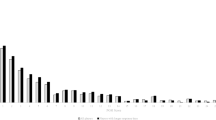Abstract
In order to improve the efficiency of online gambling case detection, this paper uses the decision tree algorithm as the basis to use the data features of the online gambling intelligent robot customer service platform to improve the algorithm. The system uses whether the player uses to access the accused website and whether the player has a gambling history as the trigger condition. The user management and data analysis layer are common interfaces for the interaction between users and the system, and the user's authority can be determined through the division of user authority management, and the relevant early warning information can be analyzed and decided through the interactive interface. The result of the suspect calculated by the decision tree is output to the result evaluation sub-module, and various scenarios can be set through the threshold in the module. After constructing the system model, the model is tested and researched. From the test results, it can be seen that the system constructed in this paper meets the needs of online gambling case investigation.









Similar content being viewed by others
References
Abarbanel B (2018) Gambling versus gaming: a commentary on the role of regulatory, industry, and community stakeholders in the loot box debate. Gaming Law Rev 22(4):231–234
Abbott M (2017) Gambling and gambling harm in New Zealand: a 28-year case study. Int J Ment Heal Addict 15(6):1221–1241
Bhatti JA, Thiruchelvam D, Redelmeier DA (2019) Traumatic brain injury as an independent risk factor for problem gambling: a matched case-control study. Soc Psychiatry Psychiatr Epidemiol 54(4):517–523
Chegini M, Bernard J, Berger P et al (2019) Interactive labelling of a multivariate dataset for supervised machine learning using linked visualisations, clustering, and active learning. Vis Inform 3(1):9–17
Cheng L, Kovachki NB, Welborn M et al (2019) Regression clustering for improved accuracy and training costs with molecular-orbital-based machine learning. J Chem Theory Comput 15(12):6668–6677
Elankavi R, Kalaiprasath R, Udayakumar DR (2017) A fast clustering algorithm for high-dimensional data. Int J Civ Eng Technol (IJCIET) 8(5):1220–1227
Etminan M, Sodhi M, Samii A et al (2017) Risk of gambling disorder and impulse control disorder with aripiprazole, pramipexole, and ropinirole: a pharmacoepidemiologic study. J Clin Psychopharmacol 37(1):102–104
Giri YR, Peteru SR (2019) Escalation of gambling associated with aripiprazole: a case report and literature review. J Psychiatr Pract® 25(2):139–145
Harris A, Parke A, Griffiths MD (2018) The case for using personally relevant and emotionally stimulating gambling messages as a gambling harm-minimisation strategy. Int J Ment Heal Addict 16(2):266–275
Ioannidis K, Hook R, Wickham K et al (2019) Impulsivity in gambling disorder and problem gambling: a meta-analysis. Neuropsychopharmacology 44(8):1354–1361
Li J, Kim WG, Wong IKA (2017) Does destination perception differ based on traveler type? A case of the world gambling capital: Macau. Tour Plan Dev 14(1):15–30
Livingstone C, Adams P, Cassidy R et al (2018) On gambling research, social science and the consequences of commercial gambling. Int Gambl Stud 18(1):56–68
Martinotti G, Chillemi E, Lupi M et al (2018) Gambling disorder and bilateral transcranial direct current stimulation: a case report. J Behav Addict 7(3):834–837
Mirmozaffari M, Boskabadi A, Azeem G et al (2020) Machine learning clustering algorithms based on the DEA optimization approach for banking system in developing countries. Eur J Eng Res Sci 5(6):651–658
Mydhili SK, Periyanayagi S, Baskar S et al (2020) Machine learning based multi scale parallel K-means++ clustering for cloud assisted internet of things. Peer-to-Peer Netw Appl 13(6):2023–2035
Nandi A, Bowman JM, Houston PA (2020) Machine learning approach for rate constants. II. Clustering, training, and predictions for the O (3P)+ HCl→ OH+ Cl reaction. J Phys Chem A 124(28):5746–5755
Pang D, Goseva-Popstojanova K, Devine T et al (2018) A novel single-pulse search approach to detection of dispersed radio pulses using clustering and supervised machine learning. Mon Not R Astron Soc 480(3):3302–3323
Parker AJ, Barnard AS (2019) Selecting appropriate clustering methods for materials science applications of machine learning. Adv Theory Simul 2(12):1900145
Peterson E, Forlano R (2017) Partial dopamine agonist-induced pathological gambling and impulse-control deficit on low-dose aripiprazole. Australas Psychiatry 25(6):614–616
Smiraglia RP, Cai X (2017) Tracking the evolution of clustering, machine learning, automatic indexing and automatic classification in knowledge organization. KO Knowl Organ 44(3):215–233
Steingroever H, Pachur T, Šmíra M et al (2018) Bayesian techniques for analyzing group differences in the Iowa Gambling Task: a case study of intuitive and deliberate decision-makers. Psychon Bull Rev 25(3):951–970
Sundqvist K, Rosendahl I (2019) Problem gambling and psychiatric comorbidity—risk and temporal Sequencing among women and men: results from the Swelogs case–control study. J Gambl Stud 35(3):757–771
Funding
There was no outside funding or grants received that assisted in this study.
Author information
Authors and Affiliations
Corresponding author
Ethics declarations
Conflict of interest
The authors declared that they have no conflicts of interest to this work. I declare that I do not have any commercial or associative interest that represents a conflict of interest in connection with the work submitted.
Additional information
Publisher's Note
Springer Nature remains neutral with regard to jurisdictional claims in published maps and institutional affiliations.
Rights and permissions
About this article
Cite this article
Li, G. Clue mining based on the online gambling intelligent robot customer service platform. Int J Syst Assur Eng Manag 14, 602–612 (2023). https://doi.org/10.1007/s13198-021-01328-z
Received:
Revised:
Accepted:
Published:
Issue Date:
DOI: https://doi.org/10.1007/s13198-021-01328-z




